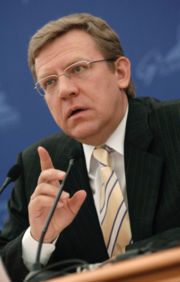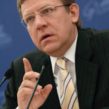
U.S. GREEN LIGHTS RUSSIAN WTO MEMBERSHIP, SEEKS AGREEMENT ON IRAN
Publication: Eurasia Daily Monitor Volume: 3 Issue: 212
By:

Last July, just before the G-8 summit in St. Petersburg, Russian Finance Minister Alexei Kudrin told reporters that Washington and Moscow had reached a deal on Russian membership in the World Trade Organization and that a final bilateral agreement would be signed during the summit (see EDM, July 14). When the deal fell through, the Kremlin was extremely disappointed and Russian-American relations, political and economic, soured. President Vladimir Putin said that Russia might consider sanctions against U.S. business interests (Vedomosti, November 13). Vyacheslav Nikonov, a Kremlin-connected political strategist from Putin’s ruling United Russia party, lamented after the St. Petersburg summit: “We have realized that they will never allow us into the WTO, and we must build our policy accordingly.”
Officially, the thorn that prevented Moscow from concluding WTO talks with Washington at the G-8 summit was the issue of U.S. meat exports to Russia. Several months of strenuous, but unsuccessful, negotiations followed the July summit, but suddenly had a breakthrough last week. The final papers will be signed this week, when both Putin and U.S. President George W. Bush attend the November 18-19 meeting of the Asia-Pacific Economic Cooperation Forum in Hanoi, Vietnam.
The details of the agreement, as listed in a fact sheet from the Office of the United States Trade Representative (ustr.gov, November 10), seem to be basically the same as the one on the table in July (Vedomosti, November 13). This may explain Putin’s anger after the St. Petersburg debacle and the public glee he expressed during a cabinet meeting this Monday, November 13, when Economic Development Minister Herman Gref reported that the WTO mission has been completed in time for the Hanoi summit, “in accordance with the directive of the President of Russia.” “Well done, thanks,” replied Putin (Itar-Tass, November 13).
After eight years of negotiating with Washington, with few significant trading concessions, Russia’s WTO membership — Putin’s major personal public goal — now seems in reach. It is honestly believed in Moscow that after a deal is secured with Washington, everything else is relatively easy. Alexander Shokhin, president of the Russian Union of Industrialists and Entrepreneurs, told RIA-Novosti news agency that Georgia and Moldova would not dare to veto Russia’s accession to the WTO after the United States had agreed.
Members of the Russian WTO negotiating team told Kommersant daily (November 10) than it was a “political decision” that had helped to finalize the trade talks last week. This may explain why more or less the same trade deal that failed in July suddenly became unassailable in November.
There is considerable speculation in Moscow on what specific political deal managed to break the WTO stalemate, some as bizarre as Moscow agreeing not to recognize South Ossetian independence in return. There may be multiple reasons for the sudden change of heart in the Bush administration, other than progress on fighting piracy and better tariffs. Simply having Russia inside the WTO and abiding by its rules may be in everybody’s interest. However, there is another issue that currently dominates U.S.-Russian relations — Iran.
Yesterday, November 14, Iranian President Mahmoud Ahmadinejad announced at a press conference in Tehran plans to build 60,000 gas centrifuges to enrich uranium. The UN yesterday accused Iran, Syria, and several other countries of smuggling weapons into Somalia to arm Islamic militants of the Islamic Courts Union. The same report accuses Iran of seeking to swap weapons for uranium in Somalia. The International Atomic Energy Agency (IAEA) has prepared yet another report that accuses Iran of continuing secret nuclear activities.
In a few years Iran may have a formidable nuclear arsenal of dozens of nuclear bombs and warheads if it manages to get enough uranium to put its 60,000 enrichment centrifuges to work. The United States and Europe have put forward a draft resolution in the UN Security Council to ban the supply of materials and technology that could contribute to Iran’s nuclear and missile programs. China and Russia oppose harsh sanctions. Russian UN Ambassador Vitaly Churkin has offered amendments that, according to U.S. Ambassador John Bolton, “cut back substantially from the scope” of the lists of suppliers of materials and technology included in the draft. Moscow is urging revisions that would remove all references to the nuclear power plant Russia is building in the Iranian city of Bushehr (AP, November 13).
Iran has only minute deposits of natural uranium. Last September Moscow agreed to supply some 100 tons of nuclear fuel uranium for Bushehr by March 2007. If Iran diverts only a small percentage of this already substantial amount of enriched uranium into its gas centrifuge complex, nothing short of military action may stop it going nuclear in a year or two.
Is the sudden WTO deal a sign that Washington and Moscow may still reach an agreement on Iran? Last week officials in Moscow hinted that the shipment of nuclear fuel to Bushehr might be postponed further than next March. Tehran took this threat seriously. A high-power delegation headed by Iran’s top nuclear negotiator, Ali Larijani, and the chief of the nuclear program, Vice President Qolam Reza Aqazadeh came to Moscow. During the weekend they met with Putin and other Russian officials to discuss Bushehr and the UN standoff. Larijani also delivered a message from Ahmadinejad.
The Iranians apparently believe they have secured Russian support. But Putin remains typically reserved. Moscow has multibillion-dollar nuclear and arms deals with Tehran in the offing that UN sanctions may ruin. Putin has said that it is counterproductive to corner Iran. However, Russia does not want a neighbor that has territorial claims in the Caspian Sea to go nuclear. Putin plans a short summit with Bush in a Moscow airport during a refueling stopover, and then both go to the summit in Hanoi. Putin clearly wants to hear what — if anything — Bush may offer on top of the WTO agreement and compare it with Ahmadinejad’s bid.




